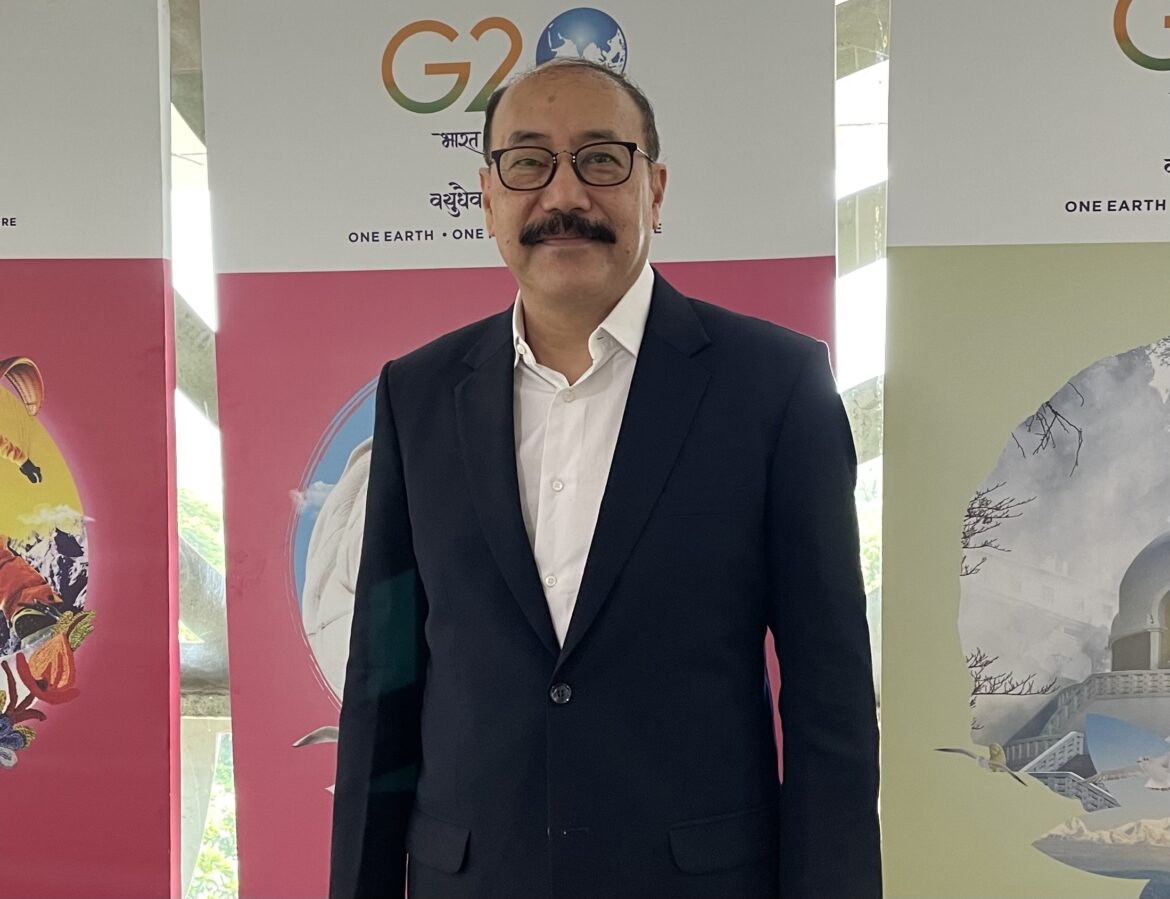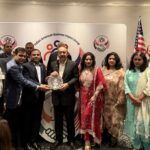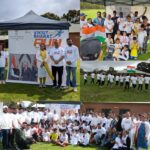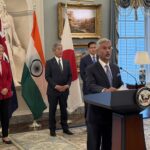As India strengthens its presence on the world stage under Prime Minister Narendra Modi’s leadership, the vision of Viksit Bharat, a developed India by 2047, has emerged as a defining national goal. The initiative not only drives domestic progress but also underscores India’s expanding global influence.
Harsh Vardhan Shringla, veteran diplomat and current Rajya Sabha MP, shared his insights in an exclusive conversation with South Asian Herald in New Delhi for the launch of the new series, “In Conversation with Rajesh Mehta.”
During the conversation, MP Shringla discussed Prime Minister Modi’s vision of Viksit Bharat in the context of his 75th year and its translation to India’s global role, particularly amid Modi-Trump chemistry, described it as “not merely aspirational, it is a practical roadmap that links India’s domestic transformation with its global leadership.” He explained on how this vision intersects with international diplomacy, foreign policy principles, developmental challenges in Northeast India, and the role of the Indian diaspora.
MP Shringla, who has played key roles in shaping India’s foreign relations, including as Chief Coordinator of India’s G20 Presidency, emphasized the practical aspects of Viksit Bharat and its implications for global partnerships.
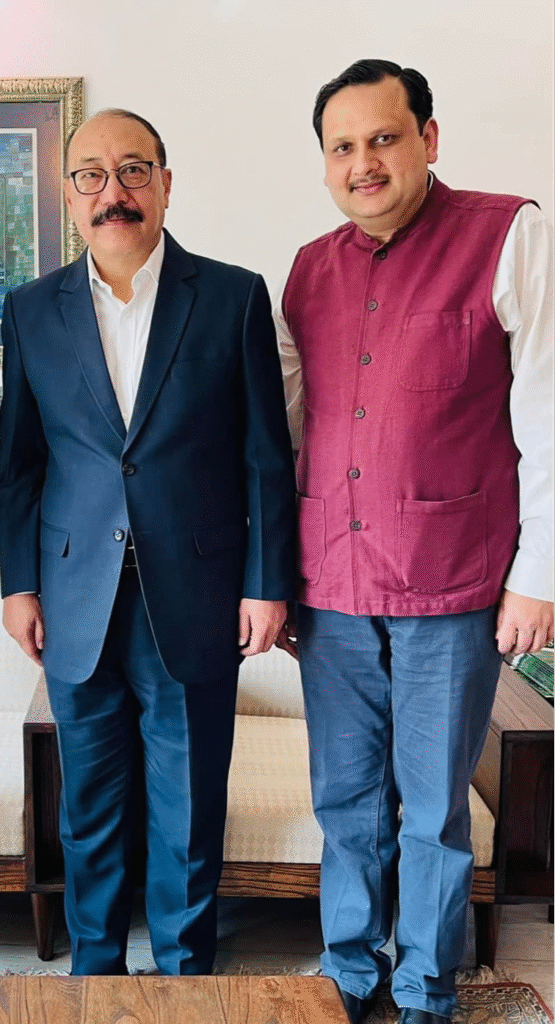
He highlighted India’s G20 Presidency as a defining moment, noting, “At a time of polarization in the world order, India was able to bring diverse nations together, deliver a consensus-based New Delhi Declaration, and set the agenda on digital inclusion, climate action, and women-led development.” This, he said, was “the first global expression of Viksit Bharat: a confident, solutions-driven India, able to translate its internal strengths into external influence.”
MP Shringla also touched on the personal chemistry between Modi and former US President Donald Trump, stating it has “given India–US relationship a new energy.” He added, “High-level chemistry with world leaders has been an important factor in advancing our interests as it opens doors and creates momentum. The Modi-Trump connect has endured the highs and lows of the relationship, and remains the enduring factor that continues to steer the way forward.”
He mentioned in one of his op-eds, “Viksit Bharat is about marrying domestic growth with international influence. As we align our internal progress with our external outreach, India will not only uplift its citizens but also emerge as an indispensable force for global stability, prosperity, and peace.”
In an era of shifting power balances and new alliances, he outlined key guiding principles for India’s foreign policy to maintain strategic autonomy while addressing global challenges like climate change, technology, and security. He stressed that “India’s foreign policy must be built on practical principles – our diplomacy must be clear-headed, institutionally rooted and oriented to India’s national interest.”
Strategic Autonomy and Selective Alignment
“Choose partners for specific ends rather than joining blocs. India’s decisions must flow from interest and principles, and not from the pressure to pick sides.” This principle, rooted in India’s ancient philosophical traditions such as the Middle Path from Buddhism and the concept of atmanirbhar (self-reliance), allows India to navigate a multipolar world without aligning rigidly with any power bloc.
In practice, as MP Shringla has noted in recent analyses, this means engaging with diverse partners like the US for Indo-Pacific stability, while maintaining independent ties with Russia and carefully managing relations with China to ensure border tranquility and broader de-escalation. This approach safeguards India’s interests amid global volatility, emphasizing moderation and flexibility in geopolitical engagements.
Institutionalize Partnerships
“Personal rapport with other leaders opens doors. But lasting gains require formal, time-bound mechanisms like trade and technology councils, defense working groups, and crisis-management hotlines so that cooperation survives political cycles.”
MP Shringla draws from his G20 experience to underscore the power of institutional architecture, where personal diplomacy, such as Modi’s outreach, is complemented by enduring structures. For instance, India’s revitalized Neighborhood First policy has led to connectivity projects like railway links with Bangladesh and Nepal, and energy grids across South Asia, ensuring partnerships outlast individual leaders. In Africa, this is reflected in India’s Ten Guiding Principles, which prioritize sustainable, transparent institutions for development without conditionalities, fostering long-term bilateral ties.
Economic Diplomacy and Supply-Chain Security
“Strengthen India’s economic footprint through proactive investment diplomacy, diversification of suppliers, and targeted industrial partnerships (semiconductors, renewables).” Economic strength underpins strategic independence, as MP Shringla emphasizes, with initiatives like diversifying energy imports and accelerating clean energy transitions to secure energy independence amid global disruptions.
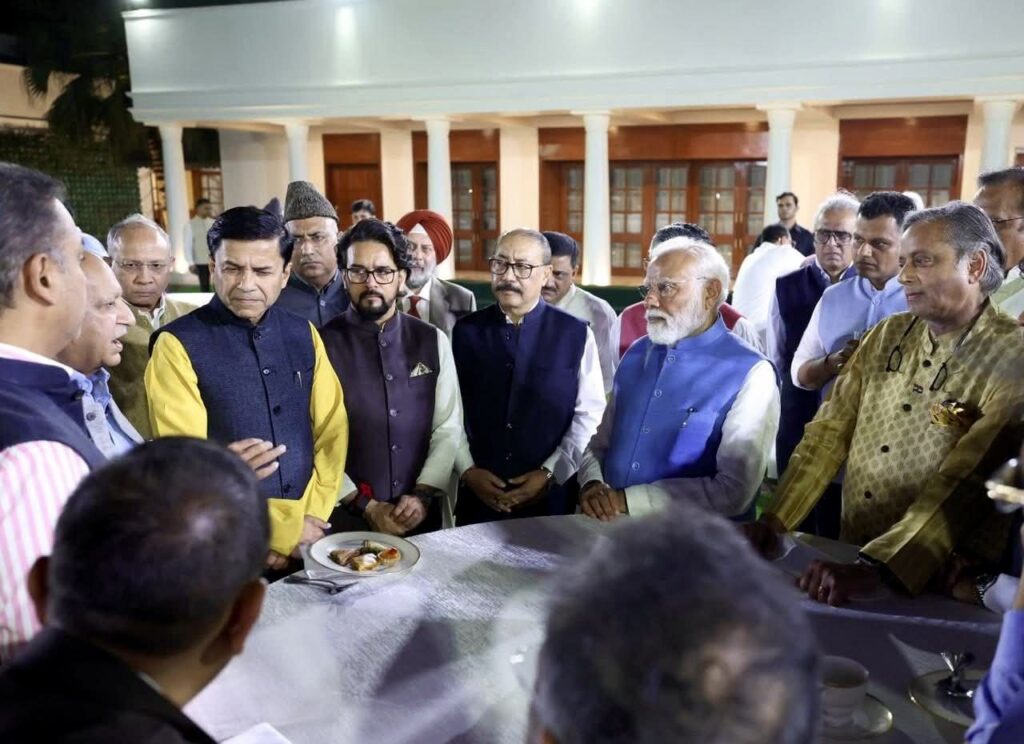
This includes massive investments in African infrastructure—189 projects across 37 countries—and duty-free market access for Least Developed Countries, creating jobs and integrating India into global supply chains while reducing vulnerabilities. Such efforts align with the SAGAR vision for the Indian Ocean, promoting security and growth through economic corridors.
Technology Governance with Partnership and Safeguards
“Engage in co-development and norms-setting for AI, data governance and critical technology is important. Cooperating where mutual benefit exists and insisting on clear, predictable rules to protect national security and developmental aims will go a long way.”
MP Shringla advocates for expanding digital public infrastructure as a global public good, exemplifying India’s leadership in equitable access to technology. This principle is evident in capacity-building programs, such as tele-education and tele-medicine services to 16 African nations, and counter-terrorism training, ensuring technology serves developmental goals while safeguarding sovereignty. In a human-centric approach, India pushes for norms that prioritize shared prosperity over dominance.
Climate Leadership with Equitable Diplomacy
“Push for pragmatic finance, technology transfer and adaptation partnerships that recognize India’s development needs while delivering global public goods, climate action must be fair and growth-friendly.” MP Shringla highlights India’s role in fostering renewable energy partnerships and clean transitions, as seen in soft loans for solar projects in Africa and advocacy for climate financing in the Global South.
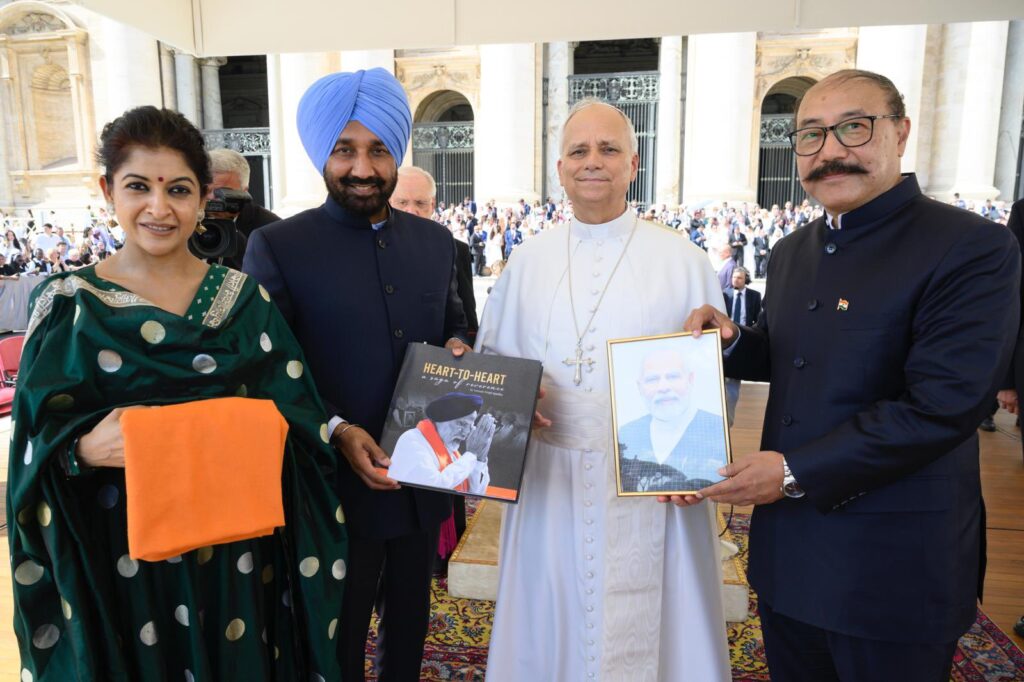
This equitable stance addresses colonial legacies and resource challenges, like in the Lake Chad basin, by promoting sustainable practices that balance development with environmental protection. India’s G20 legacy continues to champion fair climate action through successors like Brazil and South Africa.
Multilateralism that Delivers Results
“Reform and reinvigorate multilateral institutions to be more responsive.” Shringla calls for a reformed global order, including permanent membership for India in an expanded UN Security Council, to make institutions inclusive and effective. This is embodied in India’s engagement with forums like BRICS, SCO, and the Quad, leveraging its G20 presidency to advance human-centric globalization and concerns of the Global South, such as debt relief. By supporting regional bodies like the African Union, India ensures multilateralism focuses on practical outcomes for peace and prosperity.
In essence, he advocated to “preserve autonomy by being a reliable, predictable partner – one that builds institutions, pursues economic and technological self-strengthening, and leads on practical global challenges.” He praised Modi’s approach of “human-centric globalization,” rooted in the tradition of Vasudhaiva Kutumbakam, which has been appreciated worldwide, especially in the Global South.
Addressing the key developmental challenges in Northeast India and strategies for better integration while preserving cultural diversity, the MP drew from his personal connections to the region. “Northeast India faces multifaceted developmental challenges. These include inadequate infrastructure, limited connectivity, economic isolation, and environmental vulnerabilities,” he said. However, he noted significant progress under Modi’s leadership.
Reflecting on his roots in Darjeeling and Siliguri, MP Shringla explained, “While Darjeeling is not officially considered part of the Northeast, its proximity and cultural ties makes it an integral part of the broader Northeast landscape. Siliguri, often referred to as the ‘chicken’s neck,’ serves as a crucial corridor linking the Northeast with the rest of India and neighboring countries.” During the G20 Presidency, he ensured the region’s inclusion by hosting meetings in cities like Gangtok, Guwahati, Itanagar, and Darjeeling as part of the Jan Bhagidari initiative. “The success of these meetings demonstrated that when the Northeast is included in the national agenda, the results are both impactful and inspiring.”
As founder-president of the Darjeeling Welfare Society, he continues initiatives in education, healthcare, and community development. He concluded, “The Northeast must be regarded as central to India’s domestic growth and foreign policy. Strong infrastructure, diversified local economy, sensitive environmental practices, and respectful preservation of its cultural wealth will ensure the region is integrated, empowered, and will be part of a proud and vital pillar of a Viksit Bharat.”
On the contributions of the Indian diaspora, particularly in the US, to India’s global influence and steps for better government engagement amid challenges like tariff escalations, MP Shringla highlighted their pivotal role. “The Indian diaspora in the United States plays a pivotal role in enhancing India’s global influence. Their contributions span sectors such as technology, education, healthcare, and entrepreneurship, strengthening India’s soft power and fostering bilateral and multilateral ties,” he said.
As Ambassador to the US in 2019-20, he found their role “invaluable” in building bridges. “The presence of Indian communities worldwide is a true blessing. It is only in recent years that the fullest potential of the 35 million strong Indian diaspora worldwide has been realized with Prime Minister Modi’s deep connect and outreach efforts spanning across continents.” He recounted experiences from a recent All-Party Parliamentary delegation to countries including Kuwait, Bahrain, and Saudi Arabia, where the diaspora facilitated effective communication with local governments.
In conclusion, MP Shringla called the diaspora “an invaluable strategic asset,” amplifying India’s voice and strengthening ties. “By fostering stronger engagement and providing support, the government can ensure that the diaspora continues to play a central role in advancing India’s interests on the world stage.”


